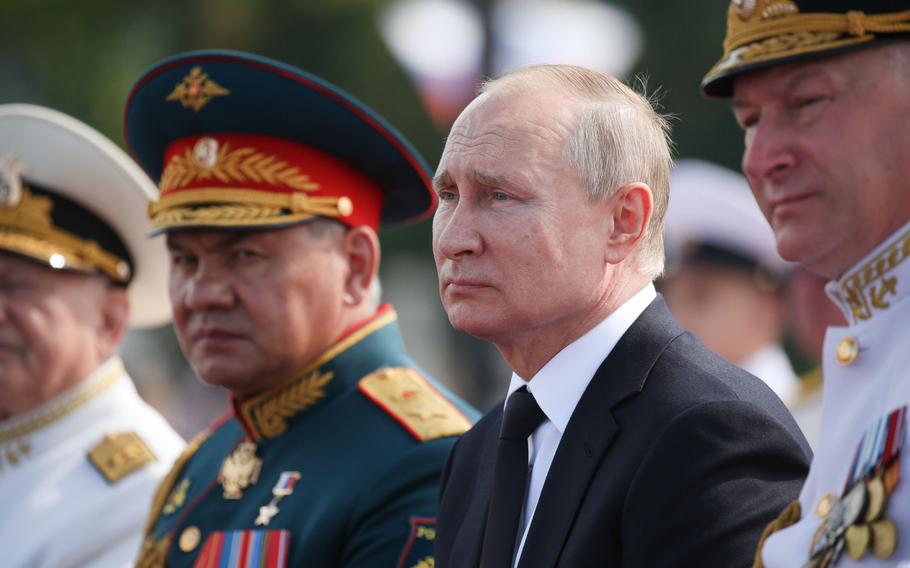Europe
AnalysisWhat we know so far about potential US-EU sanctions on Russia
Bloomberg January 31, 2022

Vladimir Putin, Russia’s president, center, sits alongside Sergei Shoigu, Russia’s defense minister, second left, during the Russian Navy day in St. Petersburg, Russia, on July 28, 2019. (Andrey Rudakov/Bloomberg)
The U.S., U.K. and the European Union are finalizing a package of sanctions that could be imposed on Russia if it invades Ukraine, trying to tailor their response to the severity of President Vladimir Putin's actions.
Moscow has denied that it's planning to invade, despite massing more than 100,000 troops near Ukraine's border. The challenge has been trying to devise deterrents that would inflict significant pain on Russia, without causing even worse harm on EU countries that rely on Russia for energy supplies.
Cutting Russian lenders off international payments network Swift is on the table but unlikely because of the collateral damage it would unleash on Europe as well. Here's the menu of options Western allies are planning in the event of a full-scale military invasion, a harder-to-pin incursion or hybrid attack.
Debt and banks
Russia would face further restrictions on refinancing its sovereign debt. The limitations could expand to borrowing on secondary markets. The country ran a budget surplus last year and doesn't need to borrow to finance spending, and there's about $40 billion in foreign investment in government bonds at present.
Russia's biggest banks would be prohibited from some interbank operations in U.S. dollars, such as clearing. A select group of banks could additionally be impacted by asset freezes, as well as limits on some transactions, borrowing and access to capital. Penalties could also be applied to some mostly domestic-facing banks that have been used to circumvent previous sanctions.
The financial institutions targeted include Sberbank and VTB
The idea of cutting Russia off from Swift is the nuclear option that some European countries, including Germany, are wary of. Under discussion are protections for some existing contracts, as well as some wind-down periods.
The White House has discussed the ripple effect of these sanctions on the global financial system with Citigroup, Bank of America, JPMorgan and Goldman Sachs. Meanwhile, the U.S. Senate is closing in on a deal for its own set of economic countermeasures against Russia even if Putin doesn't send troops into Ukraine.
Energy and metals
Energy is Europe's Achilles heel because it is highly dependent on Russia for natural gas supplies, particularly amid the current supply crunch. The sanctions here would target technology and equipment used in exploration, extraction and refineries.
Energy-related transactions could be exempt from some of the financial sanctions, alongside other caveats, such as carve-outs and so-called grandfathering (where an old rule continues to apply to some situations) and wind-down clauses.
In addition, Germany could separately prevent the Nord Stream 2 gas pipeline from Russia – which is already facing bureaucratic delays – from starting operations.
Limits could be introduced in the imports of select metals, such as steel and iron, and chemicals. There is a clear expectation by the U.S. that should Russia go for a full-scale attack that Germany would block Nord Stream 2.
Tech, luxury goods
The sanctions are expected to include export controls and bans on advanced technology and sensitive industries, such as semiconductors, aerospace, defense, and cyber surveillance technologies. Restrictions could also be imposed on goods used for both civilian and military purposes, such as in quantum computing. There could be export restrictions on some Russian luxury goods.
Individuals
Measures are being drafted to target Russian oligarchs and state-owned enterprises, with combinations of travel and trade bans and asset freezes. But the legal procedures are cumbersome, so the specifics are taking longer to hash out.
The biggest difficulties here are for the U.K., which otherwise has been the most aligned with the U.S. in terms of how hard to go. Russian billionaires have stashed billions of dollars in property and other assets in the capital, which has earned it the moniker "Londongrad." Many brought in funds from Russia into the U.K. with secret ownership of assets that can dent the effectiveness of sanctions aimed at them.
President Joe Biden has even raised the possibility that the U.S. would personally sanction Putin. The problem there is that on paper the Russian leader doesn't have much. The Kremlin however has said the political impact of those sanctions on the president himself would be tantamount to a breach in relations.
The U.K. has also announced that it will broaden the scope of its sanctioning powers so that it can target individuals close to the Kremlin in the event of an invasion.